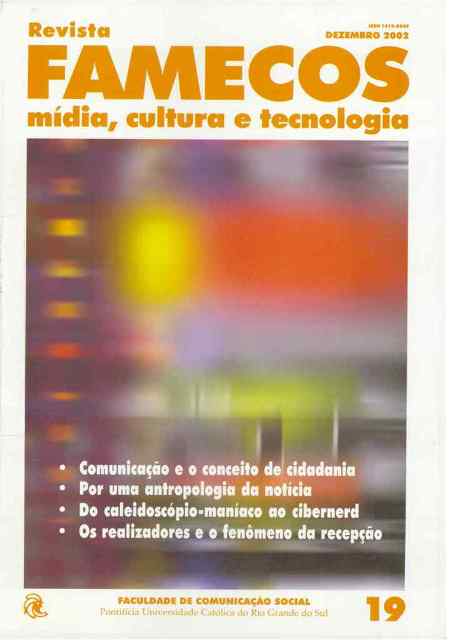Communication: one great challenge scientific and political of the XXI century
DOI:
https://doi.org/10.15448/1980-3729.2002.19.3179Keywords:
Communication, Philosophy of technics, Political philosophyAbstract
In this paper the author describes several approaches to the study of communications, showing the contribution they have brought about to a philosophy of communication related to political philosophy and to its development.
Downloads
References
ADORNO, Theodoro. L’industrie culturelle. Communications, 1963.
ANG, K. & G.. Politics and Television. Chicago: Quadrangle, 1968.
BARTHES, Roland. Mythologies. Paris: Le Seuil, 1957.
BOUGNOUX, Daniel. Sciences de l’information et de la communication. Paris: Larousse, 1993.
CANETTI, Elias. Masse et puissance. Paris: Gallimard, 1996.
CASTELLS, Manuel. La société em réseaux. Paris: Fayard, 1988.
CAZENEUVE, Jean. La société de l’ubiquité. Paris: Denoël, 1972.
ELIAS, Norbert. La société des individus. Paris: Fayard, 1991.
ELLUL, Jacques. La technique ou l’enjeu du siècle. Paris: Economica, 1980.
FRIEDMANN, Georges. Ces merveilleux instruments. Paris: Denoël-Gonthier, 1979.
GLICK, Ira; LÉVY, Sidney. Living with Television. Chicago: Aldine, 1962.
HABERMAS, Jürgen. L’espace public. Paris: Payot, 1978.
HOGGART, Richard. La culture du pauvre. Étude sur le style de vie des classes populaires em Anglaterre. Paris: de Minuit, 1970.
JEANNENEY, Jean-Noël. Une histoire des médias. Paris: Le Seuil, 1996.
KATZ, Elihu; LAZARSFELD, Paul F.. Personnel Influence: the part played by the people in the flow of mass communication. Glencoe: The Free Press, 1955.
LAZAR, Judith. Sociologie de la communication de masse. Paris: Colin, 1991.
LYOTARD, Jean-François. La condition post-moderne. Paris: De Minuit, 1979.
MCQUAIL, Denis. Mass communication theory. Londres: Sage, 1983.
MARCUSE, Herbert. L’Homme unidimensionnel. Étude sur lidéologie de la société industrielle avancée. Paris: De Minuit, 1968.
MATTELART, Armand. L’invention de la communication. Paris: La Découverte, 1994.
MORIN, Edgard. L’esprit du temps, essai sur la culture de masse. Paris: Le Seuil, 1962.
MUMFORD, Lewis. Le mythe de la machine. Paris: Fayard, 1973.
RAYNAUD, Philippe; RIALS, Stephane. Dictionnaire de la philosophie politique. Paris: PUF, 1996.
SCHAEFFER, Pierre. Machines à communiquer. Paris: Le Seuil, 1970.
SCLESSINGER, Philip. Media, state, nation, political, violence and collective identites. Londres: Sage, 1991.
SCHRAMM, Wilbur. Mass Communication. Urbana: University of Illinois Press, 1960.
SFEZ, Lucien. Dictionnaire critique de la communication. Paris: PUF, 1993.
SILLS, David L.. Internationnal Encyclopedia of Social Sciences. New York: Marmittan, 1968.
SIMONDON, Gilbert. Du mode d’existence des objets techniques. Paris: Aubier, 1969.
TARDE, Gabriel. L’opinion de la foule. Paris: PUF, 1989.
WOLTON, Dominique. Penser la communication. Paris: Flammarion, 1999.
_____________. Internet et après? Une théorie critique des nouveaux médias. Paris: Flammarion, 2000.
Downloads
Published
How to Cite
Issue
Section
License
Copyright
The submission of originals to Revista Famecos implies the transfer by the authors of the right for publication. Authors retain copyright and grant the journal right of first publication. If the authors wish to include the same data into another publication, they must cite Revista Famecos as the site of original publication.
Creative Commons License
Except where otherwise specified, material published in this journal is licensed under a Creative Commons Attribution 4.0 International license, which allows unrestricted use, distribution and reproduction in any medium, provided the original publication is correctly cited.






